Gerry Adams's Blog, page 6
October 28, 2024
Cage Eleven | No Parking | Sanctions Now.
CageEleven.
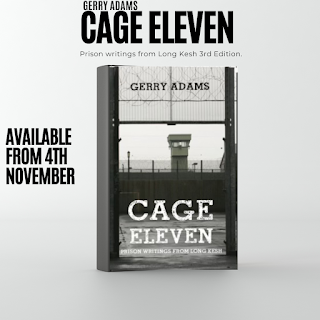
Thiscoming weekend O’Brien Press are republishing my book – Cage 11 - about myexperience of life in Long Kesh between August 1975 and February 1977. Cage 11was first published in 1990. By that time the Cages of Long Kesh were empty ofpolitical prisoners. In their place the British had built the H-Blocks andembarked on a ruthless prison policy that resulted in the 1981 hunger strike.
Thestories contained in Cage 11 reflect the trials and tribulations, as well asthe escapades that were then a part of our lives, of our families lives and ofour community. Get a couple of ex-POWs together and they will joke andbackstab, laugh and reflect on the meaning of life while talking politics. Andso it was within the barbed wire Cages of Long Kesh.
Thebulk of Cage 11 is drawn from articles which were smuggled out of thecages and published, under the pen-name “Brownie". I was one of a smallnumber of Long Kesh POWs who contributed to the weekly column in which wewrote, sometimes none too fluently, about a litany of issues that caught ourattention.
Forthe first time this new edition contains some drawings by Danny Devenny a longtime resident of Long Kesh who went on to become one of our best known,pioneering and leading mural artists. His work over decades is there for all tosee on the walls of Belfast and other places.
Almost35 years later the Cages and the H-Blocks are gone. Armagh Women’s Prison liesabandoned and Crumlin Road prison is now a tourist attraction.
Cage 11 is formally scheduledfor publication on Monday 4 November and will be available from most goodbookshops including from www.sinnfeinbookshop.com andAn Fhuiseog 55 Falls Road www.thelarkstore.ie
NoParking
Iremember Father Des Wilson many moons ago lamenting the narrowness of streetsin Turf Lodge and Ballymurphy. “The City Planners don’t think the working class should have motor cars” he said one day as we tried tomanoeuvre our way by tightly packed vehicles in Ballymurphy Drive.
Therewas a time when there were very few cars on our streets. When I was a child thestreet was our play-ground. We played handball at Harbinson’s gable in AbercornStreet North, or Shootie-Ins at the other corner down towards Sorella Streetusing an old sock stuffed with newspapers as a ball. Or Rally Oh and Kick TheTin, Marlies, street soccer, hurling and Rounders. Quoits on. Cribby. Up anddown and across the street. Sometimes we gathered up a wee gang and foughtrunning battles with wee bucks from Getty Street. Girls played Hop Scotch,Skips, numerous and intricate games with hand balls, while reciting or singingstreet songs and skipping rhymes. Ropes were draped from the old gas lamps andutilised as swings even though yards away the Dunville Park had moreconventional swings for us to play on.
Carswere a novelty. Coalcarts, the bakers van, the milkman, the Hobby Horse Man,the 'Reg' Man and the Refuse Collector made up most of our traffic. Tramsand later trolley buses were restricted to main roads. So the streetswere safe. Occasionally if we were too noisy or if our ball hit a neighbour’swindow or door we were rebuked with ‘Why dont youse go and play at your owndoor’. We always paused play when women were passing. ‘Hold the ball. Hold theball’ was the usual cry until the passer byes passed by.
Nowadaysit is rare to see children playing in the streets. There isn’t space and somedrivers don’t slow down as they should. So it’s dangerous. Too many cars. Somecommunities are lucky. They have play parks which are always packed withscreaming running yelling jumping squealing weans. All enjoying themselves. Andall our sports clubs and youth clubs and leisure centres are really well used.As they should be. And our glens and hills are well walked. Filled with fun andadventure. Places in which the imagination can thrive. We probably can’tlegislate for the excess of cars in our streets. But we can be more carefulabout how we park them.
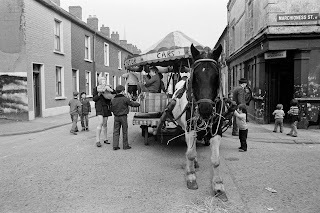
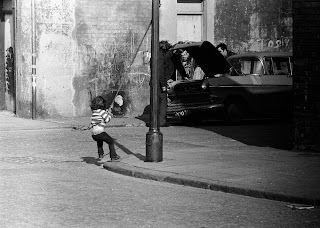
Credit for photos: Gerard Harley
SanctionsNow
InApril 2009 as part of a Sinn Féin delegation I entered the Gaza Strip. Theblockade of the area by Israel was two years old at that point. The UNWRAstaff, school teachers, doctors, university students, electedrepresentatives and workers we met were dignified and courageous, quiet butresolute. They were the survivors of an Israeli siege and a military incursionin 2008/09 that had left many dead and key facilities devastated.
Fromthe minute we passed through the Erez Crossing into Gaza under the gaze ofIsraeli watchtowers and the huge security wall that surrounds the enclave myoverwhelming sense was of entering into a huge open air prison.
TodayI am horrified at what continues to unfold each day in that place. The GazaCity I saw 15 years ago is gone. It doesn’t exist now having been reduced by USsupplied bombs and shells into piles of rubble. They have become headstones forthe many still buried beneath them. The people who survive are beingdeliberately starved. They are sick and terrified. Israel is blockinghumanitarian and medical aid.
Theimages coming out of northern Gaza defy description. The ethnic cleansingof Gaza, and at this time of northern Gaza, by the Israeli military and theforced displacement of an impoverished people are a stain on the world.Thousands of refugees are being forcibly shifted from one part of Gaza toanother by a ruthless and intolerant enemy. There is now no health service innorthern Gaza. The last operational hospital was occupied by Israel forces latelast week. Doctors were arrested. Seriously ill patients had to be moved orface murder by Israeli forces who destroyed all of the sparse drug stocks thehospital had.
B'Tselemis a prominent Israeli human rights group. In recent days it has said that theNetanyahu government is committing what it describes as some of the gravestcrimes under the laws of war. It reported that hundreds of thousands ofPalestinian are "enduring starvation, disease without access tomedical care and incessant bombardments and gunfire", and that Israelhas "cut them off from the world". It reports that sincethe beginning of this month the northern Gaza Strip has been under totalmilitary siege with almost no food, clean water or medical suppliesentering.
Callsfor a ceasefire are rejected by the Israeli Government. The overwhelming demandof the international community for Israel to stop is ignored. Why should Israelhalt its genocide when its allies in the British and American governmentsdefend its use of mass murder? Why should Israel worry when those same alliesrefuse to stop supplying it with the weapons of war?
Thedemand now must be for sanctions against the state of Israel. In particular,the Irish government which eventually recognised the state of Palestine,must now take the next steps needed to defend and uphold the democratic rightof that state to exist.
MaryLou McDonald has written to An Taoiseach Simon Harris to ask him to work withthe Opposition in the Oireachtas to ensure that the Occupied Territories Billcan pass into law before the general election is called. This would be alandmark sanction that would set an example to others around the world. TheSinn Féin leader has requested that the Select Committee on Foreign Affairs andDefence be convened next week to allow this legislation to be swiftly processedbefore the general election campaign and the formation of the nextgovernment.
AnTaoiseach should say yes. The people of Palestine need sanctions now againstthose who are trying to remove them, not just from Gaza, but from the face ofthe earth.
September 2, 2024
Champion Palestinian Self-determination | Two Good Women Gone
Champion Palestinian Self-determination
In less than five weeks the genocidal war by the Israel government against the Palestinian people will enter his second year. Having ruthlessly and cruelly waged war against the Palestinian residents of the Gaza Strip for 11 months Israel’s war machine has now shifted to a full blown pogrom against the Palestinian people in the occupied territory of the west Bank. Violence from the Israeli military, and from settlers eager to steal Palestinian land and water, had already seen over 600 Palestinians killed in the west Bank since last October. Six hostages died also executed, it appears, in Gaza hours before Israeli forces reached them. All this must be brought to an end. That means dialogue.
Last week Israeli forces embarked on a significant escalation of their actions in that part of the Occupied Territories. Under the title ‘Summer Camps’ they commenced a major offensive against the civilian population. Entire districts have been sealed off restricting Palestinian movement and many families have been forcibly displaced. The local roads, water pipes, communication networks, as well as sewage infrastructure have also been damaged. The Jenin municipality says that 70% of all roads and streets in Jenin have been destroyed.
The Palestinian Ministry of Health reported at the weekend that the Israeli invasion of the northern West Bank brings the total number of Palestinians killed by Israel and its settlers in the last eleven months to 677.
Francesca Albanese, the United Nations Special Rapporteur on the Occupied Palestinian Territories has rejected the Israeli government’s efforts to justify the west Bank pogrom under the “law of self-defence.” She said; “This claim has no validity.” The UN Rapporteur pointed out that International Court of Justice in July reaffirmed its view that “Israel’s very presence in the Occupied Palestinian Territories is itself unlawful.” She said: “As an ongoing unlawful use of force, Israel’s occupation of the Occupied Palestinian Territories cannot be justified by any claim of self-defence.”
In the Gaza Strip dozens more Palestinian civilians have been killed in recent days. Almost 41,000 Palestinians have now been killed in Israel’s genocidal assault on Gaza and almost 100,000 more have been wounded, many crippled for life.
And all of this time most western governments continue to support Israel’s genocidal policy, provide political support for it and supply Israel with armaments.
Demonstrations in support of a ceasefire and against Israeli strategies have continued to attract huge numbers. The march and rally in Dublin last weekend was great to see. On Monday Israel witnessed a general strike by Israeli trade unions angry at the failure of Netanyahu’s government to secure the release of hostages. A protest in Tel Aviv and in other cities is said to have attracted over half a million. According to media reports the strike closed much of the Israeli economy down. There appears to be growing anger at what some Israeli’s believe is Netanyahu’s deliberate obstruction of ceasefire negotiations.
Our focus must be on continuing to highlight the plight of the Palestinian people and demand an immediate ceasefire. The Irish government has a responsibility to urgently and immediately:
Call for all party talks and use its influence internationally to advocate for dialogue to end the war. Enact the Illegal Israeli settlements divestment bill.Enact the Occupied Territories Bill.Use every possible sanction available domestically and step up efforts to suspend the EU-Israel association agreement.It should also advocate for an embargo on Israel and support a thorough, independent and transparent investigation of all violations of international law committed by all actors.Most importantly it must champion the right of the Palestinian people to self-determination. As the International Court of Justice ruled in July: “It is for all States … to ensure that any impediment resulting from the illegal presence of Israel in the Occupied Palestinian Territory to the exercise of the Palestinian people of its right to self-determination is brought to an end.”
Two Good Women Gone
The recent deaths of Nell McCafferty and Edna O’Brien sparked a period of deserved and fulsome praise across the media for these two outstanding Irish women. I am sure this was a consolation for their families and friends and I extend my condolences and sympathy to them all.
I knew Nell and Edna. Not very well. But well enough to admire them both. I have not been in contact with them for some time. Like most people - and book lovers - I came across Edna through her writing. I was in my late teens when I first read The Country Girls and have been a fan ever since. This book and the two other novels which followed were disgracefully banned by the Irish Censorship Board. She was vilified in particular by the leaders of the Catholic Church.
Edna left Ireland and lived mostly in London. She went on to publish twenty novels, screen plays and numerous articles. She also won many awards for her work and as importantly as she persevered she was recognised by her peers and much admired for the way she highlighted many unjust aspects of Irish society and in particular the way that women were treated. All of this has been remembered in the many tributes paid to her.
Her support for the Irish republican cause is also worth recalling. That was part of her essence. Edna O’Brien’s values were republican values. Her Ireland was the opposite to the mean spirited, conservative and partitioned island that she grew up in. She supported our political prisoners. Her tribute to Bobby Sands, published by Brandon Books for The Bobby Sands Trust, ‘Hunger Strike- Reflections on the 1981 Hunger Strike’, says it all.
Memo to Bobby
Edna O’Brien, Writer
At the dying moment
Did you whisper a word?
We shall not know.
We can only guess at hunger
The hunger of hunger
Gargantuan, garrulous
In your pig-sty with thousands
Of hours to fill –
Guard dogs,
The Prophet Sirah,
Blackberries in Rathcoole
A mouthful of cement.
Until the blessed morning – Dementia and the letter go.
Your radiant smile
From a weather-beaten mural
How beautiful it is;
Such abundance.
Manna, it says, fell from Heaven, Once.
©: https://www.bobbysandstrust.com/
Edna O'Brien was ninety three when she died but her spirit will live on in her writing.
So too with Nell McCafferty. Nell also contributed to ‘Hunger Strike- Reflections on the 1981 Hunger Strike’. Her essay is well worth reading again. A Derry woman, she grew up in a street near to Martin McGuinness. Their mothers were close friends. Nell was part of the great popular uprising at the time of the civil rights activism in the late 1960s.
When she moved to Dublin Nell continued her activism. She was a founding member of the Irish Women’s Liberation Movement. She first came to my attention through her wonderful column in the Irish Times about Dublin’s Family Court. Her journalism was the finest example of pithy raw outrage about how the poor were treated by the legal system. That sense of outrage fuelled all Nell’s work. And she never forgot where she came from.
She wrote about the Women Prisoners on protest in Armagh. When others ignored them Nell wrote a book about them. In 1980 in an Irish Times article Nell argued that feminists had a moral obligation to support political status for the Armagh Women. The uproar that followed cost her her job.
Years later I heard her interview on RTE when she gave her opinion that the armed struggle was legitimate. She was immediately banned from the airwaves. Worst still the next day the IRA exploded a bomb in Enniskillen killing eleven people and wounding sixty others.
Her book ‘A Woman To Blame: The Kerry Babies Case’ exposed and indicted the judicial system and Garda and highlighted the ill treatment of the young woman who was treated so disgracefully. Many of us knew Nell from her television appearances, particularly on The Late Late Show. She was a star. Brave. Funny. Scathing. Eamonn McCann summed her up well in his eulogy at her funeral. She changed Ireland.
August 26, 2024
The 94 Cessation | Another Look Back at Féile 24 | Opinions, Interviews, Life Stories by James Woods
The 94 Cessation
The IRA cessation is 30 years old this Saturday. That Wednesday morning on 31 August 1994 two journalists – Barney Rowan from the BBC and Eamon Mallie from Downtown Radio – arrived at The Patio Restaurant in the Kennedy Centre. It’s where 26 West is now. They met a woman republican activist who took from her pocket a small scrap of paper – a comm – on which was written the IRA statement announcing a “complete cessation of all military operations”. While there had been significant speculation over the previous months of the possibility of a ceasefire the enormity of what was being read to them - very slowly because Mallie doesn’t have shorthand - was not lost on both.
The cessation would begin at midnight. In its statement the IRA leadership said that it believed, “that an opportunity to secure a just and lasting settlement has been created”. It noted that the “Downing Street Declaration is not a solution … A solution will only be found as a result of inclusive negotiations”.
The IRA cessation was the opening of a new phase of struggle. It was, as the Irish Nobel Poet Laureate Seamus Heaney was to write within days of its announcement – a space in which hope can grow. That was a mighty challenge especially given the range of political and military forces opposed to Sinn Féin’s efforts to build a peace process.
However progress was made. The IRA cessation of August 1994 created the opportunity for a new process of negotiations and dialogue, on the island of Ireland and internationally and from that initiative four years later the Good Friday Agreement emerged.
Thirty years later the process continues. It is part of the continuum of positive change that is required to shape out truly democratic dispensations. The peace endures and the political processes are slowly strengthening.
Now everyone knows that an end to the Union and an all Ireland settlement is possible. Such a settlement must be inclusive and fair. The future belongs to everyone. The past is passed. So thankfully is the war. Against all the odds the peace strategy delivered.
Another Look Back at Féile 24
Last week’s column reviewed aspects of West Belfasts Féile An Phobail - Féile24. In particular, the Debates and Discussions elements. It also foolishly committed me to looking back at other aspects of this year’s events. I say foolishly with good reason. The Féile has so many dimensions it is impossible to do justice to them all. Six Hundred and thirty six events in 11 days. Events for families, youth, communities, women. Including Art, Tours and Walks, Theatre, Classes, Irish Language gigs, Comedy, Food and Drink, Sport, Health and International Affairs. Literary events, the Environment. There were also Trad sessions and loads of music. So mindful of the multifarious get togethers that are omitted in this piece I am going to conclude my Féile retrospective by dealing only with music in the park.
For those of you who have never been there the space in the Falls Park is on a designated site with all services – water, electricity – piped in below the surface on what used to be the old Camogie Pitch or close to it When Féile is over the site returns to a green field. But when Féile is fully functioning it is a sight to behold. An enormous hive of activity with all necessary supports of health and safety, security, stewards, acres of food suppliers, drink outlets and an enormous stage with big screens, lights. Behind the stage is a village of portacabins and huts with support and back up for the performers. The Black Mountain is a benign back drop to this super duper arena.
With big, big concerts swinging from Dance Night to the Wolfe Tones, A Palestine Solidarity gig which was packed out despite torrential rain and a Country and Western extravaganza with an 80s and 90s night there was plenty of variety for everyone within earshot. And dancing to beat the band.
And all of it captured by Féile TV. Well done Aisling, Máirtín and Máirtín’s amazing boss – Caleb
We had loads of loyal big name Féile acts but here is a range of up and coming performers who caught my attention.
AOA: A young punk rock band from West Belfast. The Falls: 6 young local men, liofa and lyrical. New Hollande: great vocals from this Dublin duo. Roisin El Cherif: a mighty Irish Palestinian singer. Wise Wolf a Palestinian Rapper. Abood Aladham - a Jordanian and Palestinian multifaceted artist. The Palestinian Dancers. The Shan Vans; a local indigenous Irish rock group who sing í nGaeilge.
Alongside the more established groups these talented newcomers will look back at Féile 24 as their first big gig. Well done one and all. Feile Abú.
Opinions, Interviews Life Stories by James Woods
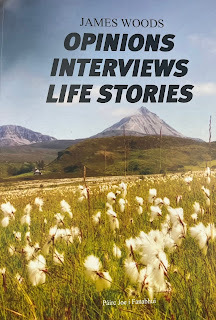
Seamus Woods is a gifted writer. This is his second book His first one, Hard Times. Good Times And The Celtic Tiger was published in 2011. I enjoyed it immensely. James brings his own unique style and insights to his writing. He is a natural story teller. He is also a long time dedicated writer of letters to the papers. Particularly on political affairs of the day. That’s how he started. In London. In 1987. Those were turbulent days in Anglo Irish history. The Letters Page of the Irish News and The Irish World gave James a platform to spell out his views especially on what was happening at that time in the North and to the Irish in Britain. As he crafted his writing skills James engaged with other newspapers – with national broadsheets as well as tabloids. His broad democratic republican views underpinned his opinion pieces. The English ruling classes and the Irish establishment’s machinations were all subjected to James’ critique. So too the unionists. As well as global affairs and international issues.
The Donegal News, The Donegal Democrat, The Finn Valley Voice and The Tír Conaill Tribune became regular publishers of James gospel, especially when he returned to his homeplace at Gorta Á Choirce. The Skibbereen Eagle was alive and well in the highlands of Donegal, home to roost and to alert us to what was happening.
Local newspapers are an important part of life in Ireland. Especially rural Ireland. The spread and popularity of social media has not changed that though all print media are under pressure in recent times. But if you want to follow local news, sports events and death notices the local news paper still provides a significant public service And that’s where James has come into his own. Many a time he has sparked debate which is both educational and entertaining.
Along with his short pithy commentary on the Letters Pages I particularly commend his longer articles where James gives a platform to local historical events, to older people and customs. This is important work. To capture and chronicle and paint a picture of times gone past or to record the thoughts of important witnesses in these changing times is a great contribution to our understanding of who and what we are and of the really important things of life. James obviously knows this His rearing in the Irish language and his love for ar teanga duchais gives him a special insight and his love for people, for craic, for Ireland and for Donegal shines out in these pages. And James is funny as well when ever that is needed.
So well done mo chara. Opinions-Interviews-Life Stories is available from seamusmacchoille@hotmail.com
August 19, 2024
A Look Back at Féile 24 | Advancing the case for Irish Unity
- 19th August 2024
A Look Back at Féile 24
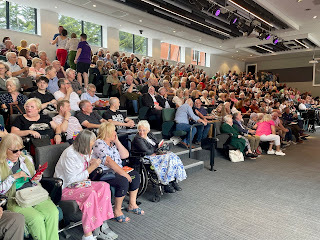
I thought I would reflect on some aspects of Féile 24 in this week’s column. In particular the debates and discussions. First of all I’m sure all Féile enthusiasts agree that this was an outstanding Féile. The debates and discussions in particular were of a very high standard and variety and audiences and speakers had a very special treat this year at their Saint Mary's mecca on the Falls Road.
Not only did they experience an outstanding programme of political debates - some 84 in total- they did so in the spectacular surroundings of a thirty million pounds refurbishment of the University College. Well done to Peter Finn and to West Belfast MP Paul Maskey. And to think the powers that be tried to close Saint Mary’s a decade or so ago.
The splendid eye catching make over enhanced the overall experience for those attending Féile. The centre piece of the renewal plan is the transformed assembly hall- now the main auditorium.
With its close to 400 soft and comfortable seats looking out through large windows onto a thoughtfully redesigned quadrangle the ‘new’ Saint Mary’s is a credit to Peter Finn and all involved. Im sure its special to be a student there.
Several of Féile’s headline events took place in the packed auditorium : the launch of 'Rita – A Memoir' a biography about republican leader Rita O' Hare; Mick Lynch, the charismatic trade union leader; Blinne Ni Ghralaigh, the world renowned Irish barrister who presented to the International Court of Justice South Africa's genocide action against Israel; Diane Abbot MP speaking on many topics including racism, and Jeremy Corbyn MP and Len McCluskey talking about their love of poetry and their new book ‘Poetry for the Many’.
Saint Mary’s new cafe and reception was a perfect setting for Féile's colourful and popular art exhibitions with its 52 distinct contributions. Well done to all our artists and in particular Micheál Gallagher who organised it all.
The horror of Israel's genocide war against the Palestinians in Gaza and the West Bank was on everyone's lips and minds at five separate events. And everywhere else. Wherever the plight of the Palestinian people could be spoken about it was.
A future focused case for an end to the Union with England included a debate on the economic benefits of a united Ireland and workers rights. Constitutional change featured at nine events. It was also reflected in sixteen talks dealing with times past which included:
The fiftieth anniversary of Michael Gaughan's death on hunger strike in June 1974 and his comradeship with Frank Stagg who also died on hunger strike in February 1976.The place of women in the liberation struggle and a tribute to Inez Mc Cormack, a feminist and life-long trade unionist.The debilitating impact of An Gorta Mór, The Great Hunger and the Irish Civil War, Belfast's pogroms and the role of IRA leader Joe McKelvey in the 1920s.Human rights, including the right to truth for the relatives of those who died in the conflict were debated alongside the rights for nature, worker's rights, Irish speakers and LGBTQI rights.
Members of the unionist and Protestant community debated the UWC strike, 50 years later. Linda Ervine and her husband Brian entertained and enlightened us. I love Brian’s writing and singing.
Union or Unity - What Matters Most' in a border poll - will we vote with the 'heart or the head' and the history of Presbyterians in West Belfast. West Belfast Talks Back filled the Saint Mary’s auditorium. When we were censored and marginalised this event was a confident gesture to our opponents to join us in debating issues of the day. It’s great that it continues in such style.
So a big thank you to all involved in making Saint Mary’s such a welcoming space. From the good folk who manage the gates and the parking, to the catering staff, cleaners, hospitality, security and all the back-up people, including the sound men, Gareth and Gerard to whom I owe a mea culpa – I was only slagging. A huge go raibh maith agaibh in particular to Elis McAteer, and to Shane, Christopher and Sharon in Peter Finn’s office and Féile’s Áine McCabe and her ever cheerful band of helpers. Saint Mary’s makes Féile and Féile makes Saint Mary’s.
Then to finish off a venue shift to south Belfast to the Ulster Museum which generated a big crowd on the last day of Féile and a very interesting debate on murals, memory and identity by Bill Rolston, the Chairperson of Féile’s Debates and Discussions group. The group which Bill chairs always delivers. This year they did it in spades.
Go raibh maith agaibh. Next week this column will reflect on Féile’s musical events and in particular the gigs in the Falls Park.
Advancing the case for Irish Unity
Lá breithe shona do Choimisiún Shinn Féin ar Thodhchaí na hÉireann - Happy birthday to Sinn Féin’s Commission on the Future of Ireland. In the summer of 2022 Sinn Féin established the Commission to advance Irish Unity through a grassroots consultation process nationally and internationally. The strap line for all of the events – Have Your Say – highlights the core aim of the Commission. It is about people having their say on the shape and composition of a new Ireland. Declan Kearney MLA is Chair of the Commission and Lynn Boylan MEP is the Vice Chair.
In the two years since then the Commission has organised 16 very successful People’s Assemblies and sectoral engagements all across the island including Belfast, Derry, Donegal, Louth, Waterford, Fermanagh, Connemara, West Tyrone and Lurgan. There have been assemblies with Women, Youth and through the medium of Irish. The Commission is also collecting written submissions and has held a series of private engagements.
A key objective is to encourage the widest engagement with the Protestant/Unionist section of our people. In Derry in October last year the Commission hosted an event entitled ‘Exploring Northern Protestant Culture and Identity’. This was a more intimate meeting and the first Commission event in which the Chairperson and panellists were all from the Protestant section of our people. Neither of the two panellists were in favour of Irish unity but the conversation was friendly and informative and the audience enjoyed the experience.
Further public and private meetings have been held and in April this year Sinn Féin published a major discussion document; ‘A New Ireland for all: Ending Sectarian Segregation’.
Understandably there has also been a lot of interest in how a future united Ireland, with a single economy, will function. Can it meet the needs of almost eight million citizens’; provide first class public services, including a public health service and much more. These and other issues were discussed two months ago when the Commission hosted a very successful and packed conference on ‘Irish Unity and the All Island Economy’ in the Europa Hotel. This week the report of that conference was published.
The panel for the event consisted of the party’s top economic spokespersons – Pearse Doherty TD, Caoimhe Archibald MLA and Conor Murphy MLA. Respected academic Cathy Gormley-Heenan performed the role of Independent Chairperson. It was a packed event in which the discussion ranged across many of the concerns and interests that citizens have about the future economic shape of a new Ireland economy.
It is now very clear that constitutional change is for an increasing number of people at the top of the political agenda. There is a growing body of economic and political opinion favouring a future based on Irish Unity. A range of economic forecasts have predicted that Irish Unity and a single island economy will lead to a stronger all-Ireland economy. This in turn will provide the financial resources needed for better health and education services, job creation and an enhancement in the standard of living of all citizens.
The key to making all of this work effectively is planning. We need a plan which shapes out what form and shape the new Ireland will look like. That means those of us who want Irish Unity creating the space in which all views can be discussed honestly and transparently. The major onus for this rests with the Irish government.
Finally, there are more People’s Assemblies and sectoral meetings planned for the remainder of the year and into 2025 and plans are advanced for similar meetings to take place with the diaspora in Canada and the USA.
The report of the Europa Conference - ‘Irish Unity and the All Island Economy’- is available through the links below in English and Irish.
https://www.sinnfein.ie/files/2024/ECONOMY_REPORT_FINAL.pdf
https://www.sinnfein.ie/files/2024/Economy_REPORT_GAEILGE_FINAL.pdf
August 12, 2024
Kneecap | Maureen Wilson – a formidable woman | Gaza – Don’t Avert your eyes
- 12th August 2024
Kneecap
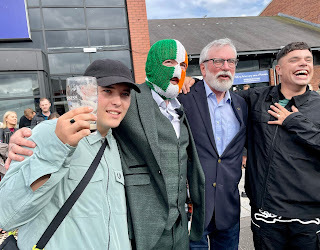
I’m a big fan of Kneecap. From the time they were called NÍ CEAPAINN – a clever use of the Irish phrase and a play on the English words Kneecapping. Ní Ceapainn means ‘I don’t reckon’ or ‘I don’t think so’. For example, in ‘An ceapainn tú go bhfuil seo ceart?’ – ‘Do you reckon this is right? Ní ceapainn. ‘I don’t reckon’. Or ‘I don’t think so.’ Anyway it soon morphed into KNEECAP. As part of a clever and provocative name recognition ploy. That’s my recollection anyway of the origin of the name of this trio of Rappers and I’m sticking by this wee bit of musical history.
The Kneecap rappers are brilliant. Provocative. Clever. Funny. Satirical. Politically and lyrically in tune with their roots. And very, very talented. Which brings me to their film. Be warned. It too is provocative. From the start it's full of foul language. One f… word follows the other at breakneck speed. There is also sex in it. Well sex scenes. So if you are thinking of bringing your Granny for a movie, beware. Not that Grannies don’t use the F.. word. Some probably have sex as well, ach is é sin sceal eile.
Kneecap the movie is like Flann O’Brien on speed. It is outrageously funny and politically unapologetic. Oh and it’s also mostly in Irish. With subtitles in English. Or French. Or Spanish depending on where you get to watch it. Because Kneecap is a worldwide hit. And deservedly so!
I won’t outline the plot. Go and watch it yourself. Suffice to say that there isn’t a bad moment in it. It’s a story about us. About West Belfast. Especially young West Belfast Gaels. The cast are outstanding. Especially the women. All of them. And Mo Chara, Móglaí Bap and DJ Próvaí. So is Michael Fassbender and everyone else. Stars galore. The cinematography is very high class. The music is ‘A’ one. It is also in many ways a tribute and a loving vindication of the community that I am delighted to be part of. We are so lucky to have such talent in our midst.
Kneecap has done us proud. Well done to Trevor Birney, Producer and Rich Peppiatt, Director, and everyone involved with this classic award winning film. Who says Irish is a dead language?
As Mo Chara would say ‘F… ing amadáns. Tá ar teanga f…ing beo’. And so it is. Kneecap Go Deo.
Maureen Wilson – a formidable woman
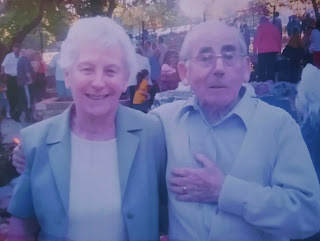
Maureen Wilson was 93 when she died in July. She was one of those countless women and men who over seven decades was a stalwart supporter and activist of Irish republicanism. It was a part of her DNA. When she died Maureen was a member of the Andersonstown Martyrs Sinn Féin Cumann.
Maureen was born on 22 March 1931 in Cavendish St. just off the Falls Road. The family were called Woods and were originally from Newry. Her Aunt Bridget had been a member of the Cumann na mBan during the Tan War. She was involved in transporting weapons for the IRA. Maureen’s mother also provided parcels for republican prisoners, many of them from outside of Belfast, who were held in Crumlin Road prison during the 1940s
Maureen met her future husband Leo in November 1947 on a bus to Lurgan to support Antrim. Leo was in the IRA and was active in Conradh na Gaeilge and the Ard Scoil in Belfast. He had a great love for Irish history, language and culture. The two became inseparable and in April 1950 they were married. They had five children Gearoid, Cormac, Pól, Padraic and Fiona.
In 1964 when Sinn Féin was banned under the Special Powers Act, Leo was one of 12 republicans who stood as independent Republicans in the general election. Maureen was beside him every day.
Later in the 1960s, Maureen and Leo were active in the civil rights campaign and in 1970 following the violent response of the state and the August pogroms of 1969 a small group of dedicated activists came together to form one of the first human rights NGO’s in the North – the Association of Legal Justice (ALJ). It included Leo Wilson, Clara Reilly, Fr. Raymond Murray, Fr. Brian Brady, Anne Murray, and others. For years the ALJ worked tirelessly to help the families of citizens detained by British forces. Their homes were open at all hours of the day and night to those in need and Maureen played an invaluable role in collating statements from victims.
In the 1970s and 80s Maureen worked with Green Cross in support of prisoners' families and was active in the Relatives Action Committee during the H-Block/Armagh protest and the hunger strikes. Throughout this period the Wilson household suffered house raids, arrests, imprisonment and ongoing harassment by the British Crown Forces.
Maureen and Leo also enthusiastically supported the building of Sinn Féin as a radical political party. They were active in election campaigns and were strongly supportive of Sinn Féin’s efforts to build a peace process.
During the negotiations our team used houses for quiet meetings – Maureen’s egg and onion sandwiches were a favourite of Martin McGuinness. Consequently when arrangements for a meeting were being made on the phone for the Wilson’s home it was always referred to as the ‘egg and onion’.
When Brendan Curran was shot and seriously injured in a gun and grenade attack on his home in Lurgan by a loyalist death squad in October 1989 he recuperated there with Maureen making sure he was well cared for.
Maureen was a strong woman. She was also very progressive. A strong Catholic she could be scathing about the failings of the church. She was also quietly feminist. She and I had many little chats on these and related issues. She always impressed me with her positivity and commonsense optimism. She will be deeply missed by her family, all of them, but especially her grandchildren and by the wider republican family of whom she was an indispensable part for seven decades.
Gaza – Don’t Avert your eyes
As I write this week’s column the merciless Israeli bombardment of the Palestinian people of Gaza continues unabated. A new order from the Israeli military this Monday morning instructs thousands of Palestinians in the city of Hamad in West Khan Younis to evacuate. They have no food and no water and nowhere to go that is safe.
Uachtarán Michael D Higgins spoke for all of us at the weekend when he described the Israeli attack on the Al-Tibin school in Gaza as a “horrific violation of human rights”. As refugees attended morning prayers in the overcrowded refugee shelter on Saturday morning Israel forces fired three missiles killing scores of Palestinian civilians, mainly women and children. The loss of life brings the known death total close to 40,000 people.
Al-Tibin was the 10th school in the last couple of weeks in which massacres by Israeli forces have occurred. Israel’s genocide has destroyed most of Gaza’s neighbourhoods forcing families to repeatedly flee. Every hospital has been attacked, most destroyed, refugee camps have been destroyed and thousands of bodies remain buried under the rubble.
President Higgins declared, “There is no room anymore for anyone to avert their gaze”. He is right. Israel’s genocidal war demands international intervention. The failure of the USA, the EU, France, Germany and the British and others to confront Israel is shameful.
August 5, 2024
No to racists and fascists - No Pasarán! | Rita O’Hare – friend and patriot | More stories from the Grave
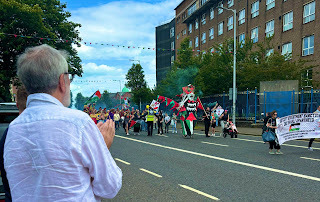
I was delighted to attend Féile An Phobail’s Carnival Parade last Saturday as it meandered its colourful, inclusive and vibrant way from the Dunville Park to An Sportlann on Bothar na bhFal. Underage representatives of local GAA clubs, other sporting organisations, community groups and numerous street artistes joined ethnic groups as they danced their way up the road. Led by a battalion of motor bikers and more sedate Lambretta scooterists, Palestinian flags were on display the length of the walk. It was brilliant, noisy, cheerful and uplifting
It was also in complete contrast to the behaviour of the fascist and racist gangs who gathered at the City Hall as part of far right demonstrations organised across the ‘Kingdom’ against refugees following the awful events in Southport in England. Events which have no connection with refugees, awful as they were with the terrible deadly attack on school children, but which were seized upon to feed racist hatred through disinformation and false narratives.
Thankfully the progressive citizens who gathered to oppose the fascists vastly outnumbered them. They are more representative of the majority of Belfast people than the amadans and ne’er-do-wells who screamed their invective and racist hatred.
One concern that I share with many is the approach of the PSNI to effectively stand up to the racists. Businesses were destroyed, citizens threatened and intimidated, a refugee centre attacked and when the fascists attempted to march on the Ormeau Road the PSNI faced the residents who opposed the fascists not the fascists. Well done to Deirdre Hargey, Gerard Rice and the people of that proud district who rose to the challenge and faced down the bigots and racists.
Let us be alert to the reality that this type of reactionary right wing thuggery will now be a constant in our lives. Just below the surface perhaps until now it is out in the open these days. We must oppose it without hesitation. It is too dangerous to ignore or dismiss.
We need also to be mindful that some deprived working people across Ireland, urban and rural, may resent people coming here from across the world to avail, they fear, of scarce resources. We need to fight for these resources for everyone and we also need to engage with these citizens to remind them that their resentment needs to be directed at the British and Irish establishments and not at the refugees or migrants who make their way to our shores. In other words while being mindful of genuine concerns, we need to be avowedly anti-racist.
Belfast is the city which stopped slave ships from doing business here in the past. Led by United Irishmen and women like Mary Ann McCracken and Thomas McCabe Belfast said NO to inequality and the slave trade and YES to equality and enlightenment. That is the real Belfast and we need to live by these principles today.
Those who carried the Coolock Says No do not represent the people of Coolock any more than the loyalists who they joined with, represent the rest of us. So let us be alert. And let us be active. No Pasarán!
Rita O’Hare – friend and patriot
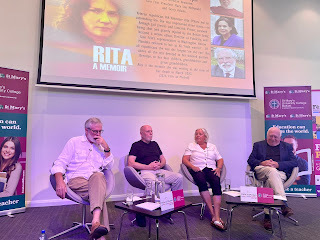
Rita O’Hare is probably one of best known Irish Republican activists of the last six decades. She was a close friend and a comrade, as well as a wife and mother, grandmother and great grandmother and someone who worked tirelessly in pursuit of Irish freedom and self-determination.
On Saturday we published her memoir. It was a great event as part of Féile. Rita - A Memoir is an amazing personal account of a life of struggle. Of a woman who fiercely confronted the injustices of the unionist and British state in Ireland. Who put her life and liberty on the line while working tirelessly to build a better future for the people of our island.
I have long believed that all of us have our own stories to tell and whenever I can I encourage people who do that. This is important everywhere. But especially in Ireland in these post-conflict times. By setting our different narratives side by side we have the possibility of a more complete and inclusive insight into the past and how and why conflict occurred. And how it might be avoided.
Rita’s remarkable story needed to be told but only she could do it justice. Persuading her to put pen to paper took years and is too long a tale to tell here but eventually Rita relented. Sadly her death from cancer came before she had the opportunity to fully complete the memoir. Editing what she left in the written word and on audio tape when she was too ill to write, fell to Danny Morrison who has done Rita proud and the rest of us a great service.
So, ‘RITA – A MEMOIR’ is incomplete as a political memoir but absolutely a gem as a personal one. Her story is of someone who was very connected to her family - to Brendan, her children, her grandchildren, great grandchildren, and, of course, to her parents, Maureen and Billy. And of an activist who demanded 100% from herself and from those of us who worked with her.
As a writer and editor of An Phoblacht, as a long standing member of the Sinn Féin Ard Chomhairle in many vital roles; as a negotiator with the Irish government and the US administration during the early days of the peace process; and as Sinn Féin’s representative for more than 20 years in the USA, Rita was a tour de force at the heart of republican politics.
She could also be blunt, acerbic, and scathing in her observations. She was relentless in her criticism of those who presided over Ireland’s inequalities, unfair systems, including the partition of our island and our people. As a survivor of a British Army ambush in which she was shot multiple times, as a political prisoner who served three different terms of imprisonment North and South, and as a woman she brought a unique perspective to our republican politics.
‘RITA A MEMOIR’ stands proudly alongside other similar accounts of struggle from Tom Clarke, Terence Mac Swiney, Ernie O’Malley, and Margaret Buckley to activists in more recent years like Bobby Sands, Jim ‘Jazz’ McCann, Síle Darragh, Eoghan MacCormaic and many more.
Rita died peacefully in March last year at home with her beloved Brendan and their clann, shortly after her eightieth birthday. ‘RITA A MEMOIR’ is published by Greenisland Press and is available at https://www.sinnfeinbookshop.com/ and https://www.thelarkstore.ie/
More stories from the Grave
I have known Tom Hartley for almost 60 years. During that time he has been the consummate political activist as a leader of Sinn Féin in Belfast and nationally. He is an archivist and a collector who has done more than anyone else to ensure that the Ulster Museum and Linen Hall Library have a range of artefacts and materials that tell the story of Irish republicanism.
Tom is a first class historian and in this capacity he has written three excellent books on the City Cemetery; Milltown Cemetery, and Balmoral Cemetery. Tom cleverly uses the stories of those buried in these places to tell the story of Belfast in all its complexity.
Last week Tom published ‘More Stories from Belfast City Cemetery’. This is a collection of new stories that he has uncovered as he continues to research the Belfast cemeteries. In this book he tells the reader of the man who built the Titanic and of the first woman to be licensed as a doctor in Ireland. He tells of Presbyterian missionaries, the man who built the Grand Opera House, the accidental deaths of workers in the Belfast shipyards, as well as the graves of some who were killed in the Belfast riots of the 19th century. And much more including the story of Jim Hargey, a former internee, leader of the Republican Clubs and a community activist in the Market. He was also a fine singer.
Toms latest book is well worth a read. So if you want to know a little more about Belfast get your hands on ‘More Stories from Belfast City Cemetery’. You will not be disappointed. The book will be available at https://www.sinnfeinbookshop.com/ and https://www.thelarkstore.ie/
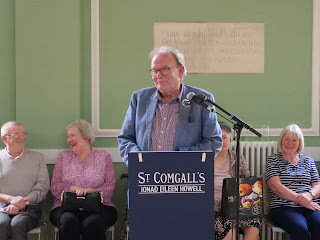
July 29, 2024
Moore Street – Rising to our Future | International solidarity needed to end Israel’s genocidal war | Féile Arís
- 29th July 2024
Moore Street – Rising to our Future
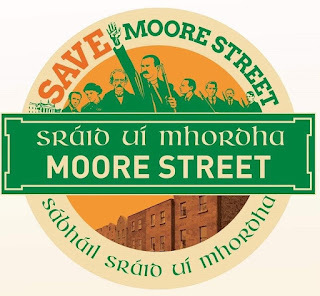
The campaign to save the 1916 Moore Street Battlefield site and those iconic buildings and streetscape that are forever linked to the most important historic event in modern Irish history has reached another potentially decisive moment.
In May, An Taoiseach Simon Harris announced the establishment of “a Taskforce to take a holistic view of the measures required to rejuvenate Dublin City Centre, north and south”. The stated objective is to make Dublin City Centre “a more thriving, attractive, and safe cityscape; and a desirable location to live, work, do business and visit.” The Taskforce is expected to report this month (August).
On Monday, James Connolly Heron, Christina McLoughlin and Honor Ó Brolcháin of the Moore St. Preservation Trust and architect Seán Ó Muirí who is the Design Principle at Fuinneamh Workshop - an award winning architectural company based in Cork - met with David McRedmond, CEO of the Taskforce. The delegation presented Mr. McRedmond with a copy of the alternative plan for the development of the 1916 Battlefield site as a 1916 Cultural Quarter and a new publication – Preserving Our Past – Rising to our Future – which provides a summary of the alternative plan and a report of the successful conference held by the Trust in the GPO in April.
The property developer Hammerson in its redevelopment proposals for the area has lodged five planning applications. These have been appealed to An Bord Pleanála and decisions are still awaited. At the same time Hammerson has initiated legal action against the City Council because Councillors voted to add historic Moore Street buildings to the Record of Protected Structures.
The Trust delegation highlighted the enormous threat to the 1916 Battlefield site posed by the Hammerson plan. Hammerson’s proposals do not meet the agreed recommendations of the advisory group that reported several years ago to the Minister. Hammersons propose the destruction of buildings linked directly to the Easter Rising.
On the other hand the Trust plan not only meets all of the agreed recommendations of the Ministerial advisory group but also satisfies the objections of the Department itself to the extent of the developer's proposed demolitions throughout the site.
Monday’s meeting provided a significant opportunity to impress upon Mr McRedmond and the Taskforce that the creation of a Moore St. Historic and Cultural Quarter will contribute enormously to the rejuvenation of Dublin City Centre and its aim of making it a “desirable location to live, work, do business and visit.”
The historic Moore Street 1916 battlefield site and the traditional street market are crucial in any approach to improving the centre of our capital city. Moore Street campaigners, including the Moore Street Preservation Trust, are determined to protect this area and to ensure its transformation into a cultural quarter, truly cherishing our past and rising to our future.
International solidarity needed to end Israel’s genocidal war
By the end of this week more than 40,000 people, mostly children and women, will have been slaughtered by Israel in the Gaza Strip. The Strip has been reduced to rubble and hundreds of thousands of Palestinians have been left without shelter, food, clean water and sanitation. This is an Israeli made humanitarian disaster.
Day after day courageous journalists living under constant threat from Israeli snipers, drones and bombs continue to report Israel’s targeted bombing of refugees; the massacre of families living in tents; and of children starving because Israel is preventing food and medical aid from entering Gaza. In recent days Israeli soldiers deliberately destroyed a water treatment plant in the Tel Sultan neighbourhood of Rafah and an MRI machine at the Turkish hospital in Gaza. This is genocide.
However, even in the midst of all of this dreadful suffering there have been important and positive developments. A fortnight ago the International Court of Justice (ICJ) ruled that the occupation and annexation of the Palestinian territories by Israel is unlawful. It also concluded that Israel’s discriminatory laws and policies against Palestinians violate the prohibition on racial segregation and apartheid.
This is a defining moment for the international community and in particular for Israel’s allies who by their support of Israel endorse its apartheid policies. Do they support international law or Israel’s flouting of that law? Is Israel to be held to account for its genocidal/apartheid policies? At this time there is no reason to believe that Israel and its allies will change direction. Achieving that will depend on building international support for international law. This too will not be easy but we cannot give up in our efforts.
Therefore our demands are clear. These must include the withdrawal by Israel from all Palestinian occupied land. There must be an immediate ceasefire by Israeli forces in the Gaza Strip. All hostages, including the thousands of Palestinians held by Israel must be released. Humanitarian aid must have free access to Gaza. There must be an immediate halt to the expansion of Israeli settlements. Palestinian statehood and the rights inherent in that must be accepted by Israel and its allies.
Finally, in a very welcome move Hamas and Fatah and 12 other Palestinian groups signed a ‘national unity’ agreement in Beijing aimed at maintaining Palestinian control over the Gaza Strip once Israel’s genocidal war on the besieged territory ends. The agreement calls for ‘interim national reconciliation government’ to govern Gaza.
Israel and its allies have sought to dictate the terms of any governance arrangement for the Gaza strip in any post war situation, including Israel maintaining control of the territory. All of these have been predicated on limiting the democratic rights of the Palestinian people to chose their own representatives and government. This cannot be allowed. The Palestinian people have the right to self-determination.
Féile Aris
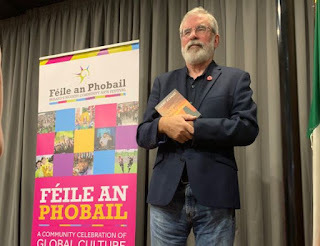
It is Féile An Phobail time again. Well done to Kevin Gamble and all the Féile team for once again bringing us a truly outstanding Féile programme. There was a time, now receding in memory for many people and never in the memory of countless more who weren’t born in those troubled times, when August, and the anniversary of Internment, was marked by incursions of British troops and RUC into republican neighbourhoods and days of rioting and deaths and injuries.
Féile An Phobail has replaced all that. It started following the killing in Gibraltar of three local people, IRA Volunteers Dan McCann, Seán Savage and Mairead Farrell at the behest of Margaret Thatcher in March 1988 and the deaths of others at their funerals. Our community was demonised in a tsunami of invective by the establishment media and our political opponents. Féile was a communal response to that.
For thirty six years West Belfast has hosted what is now an internationally recognised community arts festival with a huge ceád mile fáilte for over 100,000 visitors who join us in celebration of all that is good about us. From August 1 to August 11 we will make music, poetry, dance and have sporting events. We will debate and argue and sing and discuss numerous issues and be inspired by one and other.
We will learn many things about the human condition. We will laugh and have a wee drink, if that is our choice. We will walk our hills and streets and be educated by wise guides. We will launch books. We will consider plans or proposals for the future. We will express solidarity with other causes. We will give other causes a platform. We will be surprised and annoyed by some of what we hear and learn. We will make new friends and refresh old friendships.
Of course we do a lot of these things a lot of the time. But during Féile we do all it nonstop and the Féile team and all their partners showcase it and facilitate entertainers and musicians and poets and historians from our own place and other places. So thank you again to all involved. And to everyone else: come along and enjoy Féile 2024 with the rest of us.
July 22, 2024
Significant boost for Unity Referendum | Have you any tickets?
This summer the momentum behind the demand for constitutional change and for the Good Friday Agreement commitment to a unity referendum has dramatically increased. The very successful Ireland’s Future event in Belfast several weeks ago, the all-island economic conference by Sinn Féin’s Commission on the Future of Ireland, the emergence of a small but resolute grouping of United Irelanders from within Northern Protestantism and the positive soundings from an increasingly vocal pro-uniting Ireland lobby in the 26 counties, including from some within the political establishment, means that hardly a day passes without the issue of Irish Unity being raised in the political discourse.
Last week’s publication of the report from the Oireachtas Joint Committee on the Implementation of the Good Friday Agreement - ‘Perspectives on Constitutional Change: Finance and Economics’ – marks a new and decisive moment in the unity debate. The Joint Committee includes eight TDs and six Senators representing all of the major parties in Leinster House, as well as independent voices. Its report makes for remarkable reading.
Its starting point is the Good Friday Agreement which for the first time ever created a peaceful and democratic path to the achievement of constitutional change through referendums North and South. Immediately after last year’s 25th anniversary of the Agreement, the Joint Committee began holding a series of meetings to explore what a united Ireland would mean. The report, published on 16 July, represents the consensus conclusions of all of the participants and represents a fundamental shift in mapping out an agreed strategy for achieving Irish Unity. It examines the economic relationship between the two jurisdictions and the potential of the all-island economy.
It looks at the likely cost of Irish Unity and the need for the Irish government to build a consensus on the future shape of a united Ireland. In this respect its’ call for the government to begin immediately planning for a referendum on constitutional change marks a striking change in the approach of the political system in the South. Its conclusion is best summed up in the final sentence of the summary of the report which states: “Preparation for referenda on Irish unification will be a historic task. The Committee calls for preparation to begin immediately”. For this process to be successful the Joint Committee calls for a whole of government approach, led by the Department of the Taoiseach, and involving all government departments and state agencies examining the implications of constitutional change. The Joint Committee recommends that a government Green Paper should be published setting out a vision for a united Ireland. Such a paper will require widespread consultation to ensure its conclusions reflect a consensus on the way forward.
In preparing for the unity referendum the Committee emphasises the key role of the civic engagement that occurred around referendums in recent years, including the use of “Citizens’ Assemblies – “Engagement should take place on a sector-by-sector basis. These forums should be as inclusive as possible”.
The report also stresses the importance of an inclusive approach that can facilitate participation by “vulnerable groups and sectors of society that are traditionally underrepresented in policy making” including reaching out and securing engagement from unionism. And it makes a series of recommendations for increased North South co-operation to include:
· Education, including measures to facilitate teachers crossing the border or working in both jurisdiction throughout their careers, including supports to meet the Irish language requirement for primary school teachers.
· Further and Higher Education, including reducing barriers to cross border student enrolment particularly for students from the North studying in the South and strengthen North/South co-operation on apprenticeships and training.
· Energy and on climate action, including increased co-operation through Strand two of the Good Friday Agreement that builds on the progress of single electricity market.
· Transport infrastructure, including implementation of government commitments on the A5 as soon as possible.
· Attracting Foreign Direct Investment (FDI), including closer co-operation between the IDA and Invest NI and part of this should be to ensure greater benefit for areas outside of Dublin and Belfast benefit from FDI.
· Civil service and governance, including developing a North/South exchange programme for civil servants.
Republicans will find much in this report that dovetails with our own policy proposals in recent years and our thoughts on the planning for unity. But like the Good Friday Agreement producing recommendations is one thing, getting them implemented is an entirely different matter.
Therefore it is vitally important that all of us who advocate for Irish Unity read this report and recognise its singular significance in the current constitutional debate. The Joint Committee report provides a historic opportunity and challenge to shift the conversation on Irish unity into a substantially higher gear.
Uachtarán Mary Lou McDonald TD put it well when she welcomed the report. She said: “The report acknowledges that there are no insurmountable economic or financial barriers to unification. The economic success of a new Ireland is in our own hands. What is needed now is detailed and ambitious preparations. Our task is to build a consensus on the vision for a new and united Ireland. Preparing for such a referendum is a historic task and a huge opportunity that requires significant groundwork and a well-prepared constitutional pathway.”
If you want to read the Joint Committee report it is available here:
https://data.oireachtas.ie/ie/oireachtas/committee/dail/33/joint_committee_on_the_implementation_of_the_good_friday_agreement/reports/2024/2024-07-16_perspectives-on-constitutional-change-finance-and-economics_en.pdf
Watch Seanadóir Rose Conway Walsh talk about the report here: https://www.facebook.com/reel/873249191346812
Have you any tickets?
There was a time back in the day when I was able to get a ticket for All Irelands. In those days getting a ticket was part of the build up to the big day. It was great fun Stressful and challenging but great fun nonetheless. My first All Ireland was in 1960. I didn’t have to worry about a ticket that day. I was only twelve. My Uncle Paddy took care of all the logistics. We went by rented car which was a novelty in those days. Down won and I still have a clear memory of standing on the terraces as Kerry was dispatched and Sam Maguire came over the border. That’s what my Uncle Paddy sang all the way home – “The cups coming over the border, the border, the border, the border”.
In those days it was possible to lift a child over the turnstile for free entry. I don’t recall if that happened to me in 1960 but for ages in the late 70’s and 80’s I used to lift our Gearóid over the turnstile. Sometimes he would be accompanied by cousins but the match stewards were very tolerant and as long as we had a couple of tickets between us they made us welcome. Many a great game was enjoyed by us. Then understandably health and safety concerns kicked in and all this changed. Rightly so.
That’s when tickets became even more precious. And more expensive. The new Croker stadium followed soon after but it was still possible to wrangle tickets. There was great competition on the ticket front as well as on the playing fields, especially as the Ulster teams started to dominate the football championship. My friend Father Alex Reid was a great Gael. He was usually catered for by the Rice brothers but even he had to seek divine intervention when that source dried up. An old friend of mine in County Louth looked after me for years. Of course with Father Alex and myself the hurling games were the big contests.
And then I got elected to the Dáil and with that came an invite from Croker to the Ard Chomhairle section so I fell out of the habit of scrounging for tickets. Martin McGuinness got a similar invite by virtue of his elevation to the Office of First and Deputy First Minister and we spent many a happy All Ireland together. That’s when Martin was won over to the thrills, skills and sheer superiority of hurling.
All Ireland Sundays in Croke, for both codes and for Ladies Football and Camogie are super. I don’t travel there so much these days. It’s easier to watch on television and I’ve yet to adjust to the new July finals schedule. I was at the Tailteann Cup semi final recently supporting Antrim’s footballers and although the result was disappointing it was a great day out. I was seated behind a big contingent of young Laois fans and the craic was ninety.
I did try to get hurling tickets last week for the hurling only to find that all my old contacts are dead or without influence. Just like myself. I left it too late. The tickets weren’t for me so I wasn’t too disappointed. Now as we go to print I’m being plagued by Armagh and Galway supporters. Ach well I don’t blame any of them for chancing their arm. I’ve been there. Done that.
So if you have any spare tickets give me a shout. Le do thoil.
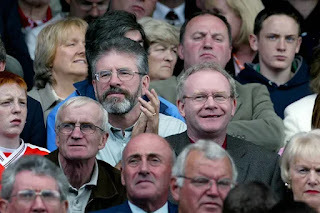
July 15, 2024
Solidarity Works | Release Leonard Peltier | Lies and Hypocrisy
Solidarity Works
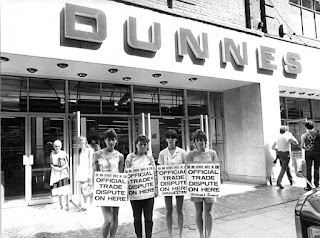
Forty years ago this month, ten workers from the Henry Street branch of Dunnes Stores in Dublin's city centre went on strike to protest against the selling of produce from Apartheid South Africa. A year later, the group was joined by another worker, Brendan Barron, from the Crumlin store, bringing their number to eleven. The strike lasted for almost three years. I remember it well. I joined the picket line a few times and Sinn Féin and An Phoblacht were firm supporters of the Dunnes Store strikers. Their courageous stand led to the Dublin government banning South African goods from Irish stores. The strike followed a decision by the Irish Distributive and Administrative Union IDATU, now the Mandate union, not to handle South African produce.
On Thursday 19 July 1984 a customer approached Mary Manning, who was on the checkout, with two South African Outspan oranges. Mary politely told the customer she couldn't handle the goods because they were South African. The Dunnes Store management immediately sent for Mary Manning and her Shop Steward Karen Gearon. Mary was given five minutes to reconsider her position. According to an An Phoblacht report
"Mary was brought upstairs with myself and was given five minutes to reconsider her position," Karen says. "We weren't allowed talk to each other during the five minutes. She was kept in one room and I was kept in the other. And then we came back in and Mary said, 'No, I'm sticking by my position', and the Dunnes Stores strike began”.
"We decided we wanted to learn more about the issue, and so we started to look into South Africa and what was happening there," Karen remembers. "The more we learned, the more passionate we felt.
The strike began to gain serious momentum when Archbishop Desmond Tutu invited some of the group to meet him in London while he was en route to collect the Nobel Peace Prize. Karen, Mary Manning, union official Brendan Archbold and the meeting's organiser, Don Mullen, travelled over.
"That was definitely the turning point," says Karen. "We got massive publicity and he invited the strikers to visit South Africa. A plan was made to travel to South Africa on the first anniversary of the start of the strike. We had no money to carry out our plan, so we had to do a collection," Karen says.
"One Friday night we went out around Dublin and raised £6,000. That showed us just how much support was out there, because the '80s wouldn't have been an affluent time in Ireland."
Karen remembers the trip being a nightmare. When the plane landed in Jan Smuts Airport in Johannesburg, it was greeted by police and army officials. The group were detained there and sent home eight hours later on the same plane. This incident received huge publicity.
The strikers were on the picket line every day for three years. One winter it was so bad that some of them actually had plastic inside their shoes. One of the women, Vonnie Monroe lost her house because she couldn't make the repayments on it. They had £21 union pay a week. They all paid a heavy price for their solidarity. There was a lot of solidarity between the Dunnes Stores strikers and the miners in Britain, who were also on strike at the time. The Irish government eventually brought in a ban – the first western government to do so - and the strike officially ended in April 1987.
"We won," Karen says. "All we wanted was for us not to have to handle the goods; the bonus was the government coming out and banning them. We didn't start the movement, the movement was there before us, but we certainly brought a new life to it, and we raised its profile.”
Nelson Mandela made it a priority to meet with the Dunnes Store strikers on his release from prison in 1990. He recognised the sacrifices they made and praised their “unprecedented stand”.
Forty years later these working class – mostly women - remain an example to us all and a reminder of the importance of solidarity work, not least the need these days for solidarity with the people of Palestine.
Release Leonard Peltier
Earlier this month 79 year old native American indigenous activist Leonard Peltier was denied parole. He won’t be eligible now for another parole hearing until June 2026. His legal team will appeal the decision.
Leonard has consistently denied that he was responsible for killing of two FBI agents in 1975. His family and supporters are now deeply concerned that after almost 50 years in prison that Leonard will die there as his health has severely deteriorated in recent years.
In the intervening years an international campaign for his release has gathered momentum as the evidence of prosecutorial misconduct and due process violations has become increasingly evident. Two years ago James H. Reynolds the former US Attorney General whose office handled the prosecution and appeal in the Leonard Peltier case appealed for his sentence to be commuted. In a letter to President Biden he said: “With time, and the benefit of hindsight, I have realized that the prosecution and continued incarceration of Mr. Peltier was and is unjust”
In addition a witness who recanted her account claimed she had been forced into making a statement by the FBI. A ballistics expert who linked Peltier’s weapon to the murders was reprimanded by the federal court for lying.
In 2022 Amnesty International issued an Urgent Action notice calling for clemency for Peltier. Amnesty pointed out that in the decades since his imprisonment he has spent significant time in “solitary confinement, serving two life sentences for murder despite concerns over the fairness of his trial”. Amnesty warned that Leonard Peltier “suffers from a number of chronic health ailments, including one that is potentially fatal.”
Amnesty urged President Biden to grant Leonard Peltier clemency on “humanitarian grounds and as a matter of justice.”
Former FBI agent Colleen Rowley has accused the FBI of a “vendetta” against Peltier. In a letter she wrote: “Retribution seems to have emerged as the primary if not sole reason for continuing what looks from the outside to have become an emotion-driven ‘FBI Family’ vendetta.”
Last September on his birthday Leonard thanked all of those who have supported his cause for justice over the years. He said: “I hope to breathe free air before I die. Hope is a hard thing to hold, but no one is strong enough to take it from me … There is a lot of work left to do. I would like to get out and join you in doing it”.
I support the many calls for clemency for Leonard Peltier. He should be released to spend his remaining time with his family.
Lies and Hypocrisy
Lies, hypocrisy, double standards, starvation, and the mass murder of civilians have been essential tools in the Israeli government’s genocidal war against the Palestinian people. Some have also been a feature of the policies and propaganda employed by those governments allied to Israel’s war strategy.
Last week Russian missiles destroyed much of a children's hospital in Kyiv. A wave of other similar attacks took place against cities across the Ukraine. There was justifiable criticism of Russia which this column shares. Meanwhile the deliberate destruction of so-called ‘safe zones’ in Gaza by Israeli bombers continues using armaments supplied by western powers. Over a hundred and fifty Palestinians are known to have been killed. Many hundreds more have been left grievously injured trapped in a place that has almost no medical facilities or resources.
The bombing of the designated humanitarian zone in the al-Mawasi area near Khan Younis was the most devastating. Israel claimed it was a ‘surgical strike against Hamas’ but the photos and video of the event exposed this as a lie.
Almost 40,000 Palestinians are known to have been killed in the 10 months of Israel’s genocide. Last week a report published in the Medical Journal The Lancet stated that "186,000 or even more deaths could be attributable to the current conflict in Gaza". Doctors of the World, an NGO that has staff working in Gaza, described the estimate as ‘credible’ and its President said: "The death toll of 186,000 mentioned in The Lancet is consistent with the health, military and geopolitical situation due to the sea, air and land blockade imposed on the Gaza Strip … “.
Those governments, including the Irish government, that have condemned Israel and/or agreed to recognise the state of Palestine need to urgently agree a joint strategy to increase pressure for a permanent ceasefire, substantial aid, and an arms embargo against Israel.
July 8, 2024
AN OPEN LETTER TO KEIR STARMER | A GOOD ELECTION | TRUTH IS THE FIRST CASUALTY OF WAR
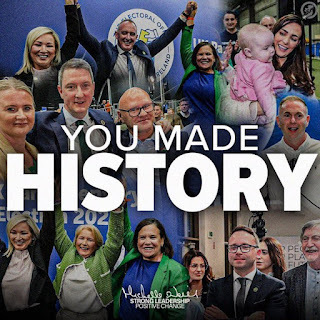
AN OPEN LETTER TO KEIR STARMER
Keir a chara,
Congratulations on your election as British Prime Minister. I wish you well in the many challenges facing you and your government. The world is very divided at this time with many violent examples of injustice, poverty, hunger and violence. I hope you will use your office in a positive and progressive way. From the Middle East to get ceasefires and stop the genocide against the people of Palestine to Ukraine and other troubled places.
The last time the British Labour Party was in Downing Street, Ireland was one of those places.
Now the conflict in Ireland has ended but many of the underlying causes remain. Your predecessor Tony Blair played a leading role in the effort to bring peace. The Good Friday Agreement in 1998 was the result of his efforts and An Taoiseach Bertie Ahern, most of the local parties and President Bill Clinton with the support of others in the international community.
Tony Blair told me once that he could not have done what he did in Ireland except in the first heady days of his premiership. I believe that. This is why I am writing to you so soon after you take up office and before the system and the pressures of other challenges distract you from your obligations to deliver on commitments on Ireland.
Your election has created an opportunity to implement the Good Friday Agreement fully, to repair the damage done by fourteen years of Tory rule and to create a better relationship with the people of Ireland represented by the Irish Government and the Northern Executive.
I note you describe yourself as a unionist. This is unfortunate. It is your union, not ours. The Good Friday Agreement has set out the way to end the union if that is what the people decide. You are obliged to uphold this and to uphold the Good Friday Agreement by ensuring that its political, legal, and constitutional guarantees are respected and implemented.
As a co-guarantor of the Agreement the British Government must embrace principles of rigorous impartiality, and the right to self-determination and constitutional change toward Irish reunification.
I note that your government has committed to repealing the Tories Legacy Act. There is also a responsibility on you to tackle the serious underfunding of public services in the North as a result of the austerity policies of the Tories and Brexit.
You have also committed to assisting the effort to build the Gaelic Games Stadium at Casement Park. As a human rights lawyer you may know that Roger Casement, who the stadium is named after, was a champion of human rights.
He was knighted for his work exposing human rights abuses in the Congo and in Peru. Later, after a show trial in London he was hanged for his part in the 1916 Rising. Other leaders were shot to death after court martials in Dublin. At his trial Casement argued that he should be tried by his peers in Ireland. He said, “This is the condemnation of English rule, of English-made law, of English government in Ireland, that it dare not rest on the will of the Irish people but exists in defiance of their will: that it is a rule, derived not from right, but from conquest.”
That was true then. It remains so. You now have the opportunity to undo that conquest. This may be too much to expect. But perhaps you might surprise us?
Casement also said, “Self government is our right, a thing born to us at birth, a thing no more to be doled out to us by another people than the right to life itself, than the right to feel the sun or smell the flowers or to love our kind.”
You certainly have the chance to usher in a new era of Anglo Irish relations based on equality and respect as set out in the Good Friday Agreement. So as I wrote at the beginning of this letter, I wish you well. But those of us who have had to endure London rule and partition will judge you on how you accept our right to rule ourselves and on how you use your influence to bring this about.
Great progress has been made against all the odds. Let's finish the process.
Le gach dea-mhéin
Gerry Adams
A GOOD ELECTION
Well done to everyone who worked in last week's election, especially candidates and their families. The success of Sinn Féin is due to the diligence and commitment of the candidates and all the activists who mobilised the republican voters and to the voters who showed great clarity and vision by voting Sinn Féin. I enjoyed immensely my interaction with many of those voters in West Belfast on polling day. The banter and craic was mighty. Their endorsement of Paul Maskey and the effort they made to vote for him was inspirational. Older people, quite a few in their nineties, turned up alongside droves of first-time republican voters. The future is bright. Thank you one and all.
TRUTH IS THE FIRST CASUALTY OF WAR
We are now into the tenth month of Israel’s genocide of the Palestinian people in the Gaza Strip and the extension of its brutal occupation of the west Bank. The human cost of this in lives lost is appalling. Almost 40,000 Palestinians have been killed. Of these 15,000 are children. The real number of deaths is higher given the numbers missing and of bodies buried beneath the rubble.
It is a well established maxim that ‘truth is the first casualty of war.’ That was true in our own place where British state control of the media was accepted practice from the beginning in controlling the narrative. The British state and its allies were the good guys – the republicans were the bad guys.
General Frank Kitson who was the British Army’s self proclaimed counter insurgency ‘expert’ established the framework by which this could be done. He called for the judiciary, the law, the police and the media, to become part of a coordinated strategy. In its Land Operations manual the British Army defines psyops as ‘the planned use of propaganda or other means, in support of our military action or presence, designed to influence to our advantage the opinions, emotions, attitudes and behaviour of our enemy, neutral and friendly groups.’
And so it is with Israel today. Through its own media and with the co-operation of the corporate media in most western states it has worked to control the narrative in defence of its criminal actions against the people of Palestine. Part of this has involved the deliberate targeting of journalists working within Gaza and the West Bank and the denial of access to Gaza by journalists from international agencies.
Last week in one day five journalists in central Gaza were killed by Israel. Bringing the total number of journalists killed to 158. In addition Israel has shut down Al Jazeera in Israel while an estimated 50 journalists have been arrested while many more are victims of harassment, threats, and assaults.
On Sunday the Foreign Press Association based in London said:
“The Foreign Press Association expresses its shock and profound disappointment that nine months into a devastating war, Israel continues to bar independent access for the international media from Gaza.
Never before has Israel enforced such a long and strict information blackout. It has repeatedly rejected our appeals for access, fought us in court to uphold this draconian ban and offered just a handful of highly controlled "embed" opportunities for a small number of our members.
At the same time, Palestinian journalists inside Gaza continue to face unprecedented threats and restrictions on movement as they courageously try to cover this story. It raises questions about what Israel doesn't want international journalists to see.
We once again call on Israel to allow international journalists unfettered and independent access to Gaza.”
The reality is that this demand for press freedom will be ignored by Israel. The onus therefore falls on all of us and especially governments opposed to Israel’s actions to demand open access to the occupied territories to report truthfully on events there. Information is key to understanding what is happening and to finding solutions.
Gerry Adams's Blog
- Gerry Adams's profile
- 29 followers



